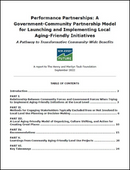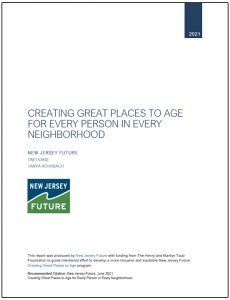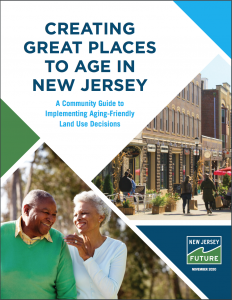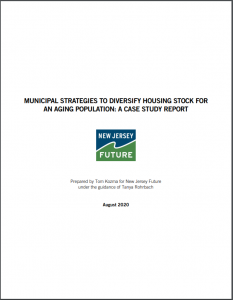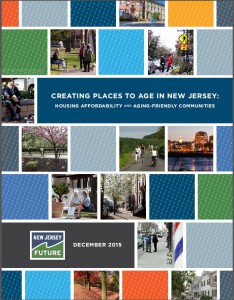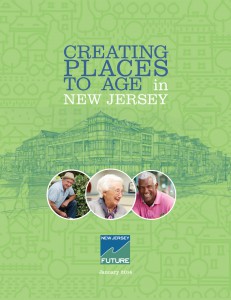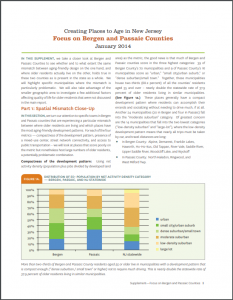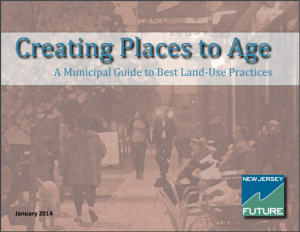Creating Great Places To Age
Recent Census Bureau projections indicate that by as soon as 2035, for the first time ever, there will be more people in the U.S. over the age of 65 than under 18. Communities with such features as a mix of uses accessible to those who don’t drive, physical and social activities, amenities such as parks and safe streets, and a mix of appropriate and affordable housing options, are places where older residents can thrive. However, many communities in New Jersey, which has the 10th largest number of residents age 60 and older in the nation, fail to offer these attributes.
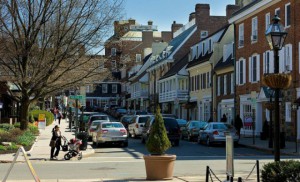
Palmer Square in Princeton. The town is the first in New Jersey to receive the World Health Organization’s Aging-Friendly designation.
Where do older residents want to live? According to surveys, most people want to stay in their communities as they get older. It’s where their social connections, medical professionals, houses of worship, and other resources and amenities are. Some people want to stay in the same house they’ve been in since they moved to the community; others may want to move to a different residence in the same town.
What do older residents need? As people age, their mobility needs may change. Many people will eventually reduce their driving, or stop altogether, making the ability to get to various destinations without a car very important. That means putting these destinations in close proximity to each other, and within easy walking or cycling reach of local residents. Some people may choose to move — from a larger single-family home to a smaller house, townhouse or apartment, closer to all the destinations they need to reach, and perhaps easier to navigate and maintain.
How prepared are New Jersey communities to meet this need? New Jersey Future has scored every municipality on three criteria that together serve as a general indicator of how well a town is positioned to meet these changing needs — whether it has a recognizable downtown or Main Street with a variety of establishments; how many typical destinations there are per square mile; and how connected the street network is. A greater number and variety of destinations per square mile makes it easier for people to accomplish daily tasks efficiently, and a well connected street network makes it easier to reach these destinations by means other than cars.
Unfortunately, the places in New Jersey where the largest numbers of older residents live are not places well positioned to meet their changing mobility needs. In New Jersey, almost half a million people aged 55 and older, or approximately 21% of all older residents in New Jersey, live in areas that scored low on all four aging-friendliness indicators. This means these residents are more dependent on a vehicle to accomplish daily tasks. The number of people who are set to grow older in car-dependent communities is projected to rise, bringing with it greater demand for transportation services and risk of greater social isolation as a result of reduced mobility.
A large number of New Jersey’s older residents are also housing cost-burdened, which means they are paying more than 30% of their income for their housing. This happens for a variety of reasons: retirement income tends to be lower than employment income while housing costs typically stay the same or rise, and a low number of the kinds of homes older people want — townhouses or apartments within walking distance of daily tasks — makes the existing supply expensive. This means older residents who would like to move to different — perhaps less expensive and more accommodating — housing cannot afford to.
What We’re Doing
With support from The Henry and Marilyn Taub Foundation and the Community Foundation of South Jersey’s Aging Innovation Fund, New Jersey Future is working with several communities to:
- Inform local officials and residents about what aging-friendly features are and how they enhance the economic as well as social character of their towns;
- Provide a snapshot of the current status of their older residents and the aging-friendliness of their community by conducting land use assessments;
- Assist municipalities in the implementation of aging-friendly strategies, including ways to:
- Enhance any downtown, main street or town center to increase the number of amenities in close proximity and make it easier for pedestrians to travel among them;
- Provide more housing and more appropriate housing types to enable older residents to remain living in their communities;
- Improve the extent and quality of their pedestrian systems to expand access to destinations such as open spaces or community facilities without having to use a car; and
- Modify land use regulations to support aging-friendly community form.
Find out more about the action through our blog, Community Design for All Ages: A New Sustainable Jersey Municipal Action.
Learn more about the importance of aging-friendly communities and our work with New Jersey towns in the December 2020 issue of New Jersey Municipalities Magazine.
For more information on New Jersey Future’s work in helping to create great aging-friendly places, please contact Community Planning Manager Tanya Rohrbach.
New Jersey Future Aging-Friendly Reports
New Jersey Future Aging-Friendly Land-Use Assessments
- Creating Great Places to Age: Aging-Friendly Land-Use Assessment for the Village of Ridgefield Park (Oct. 2020)
- Creating Great Places to Age: Aging-Friendly Land-Use Assessment for the Borough of Pompton Lakes (Sep. 2020)
- Creating Great Places to Age: Land Use Analysis of Aging Friendliness for the Borough of Teaneck (Feb. 2019)
- Creating Great Places to Age: Land Use Analysis of Aging Friendliness for the Borough of Somerdale (Jan. 2019)
- Creating Great Places to Age: Aging-Friendly Land-use Assessment for the Village of Ridgewood (Aug. 2018)
- Creating Great Places to Age: Land Use Analysis of Aging Friendliness for the Borough of Westwood (July 2018)
New Jersey Future Aging-Friendly Land-Use Implementation Plans
- Aging-friendly Land Use Action Plan For the Borough of Fair Lawn (Jan. 2021)
- Creating Great Places to Age: Aging-Friendly Land-Use Implementation Plan for the Village of Ridgewood (Aug. 2020)
New Jersey Future Aging-Friendly Toolkits
Resources for Local Aging-Friendly Community Building
- Community Design for All Ages (Sustainable Jersey)
- New Jersey Future’s Creating Places To Age: A Community Guide to Implementing Aging-Friendly Land Use Decisions (New Jersey Future)
- Evaluating Your Age-Friendly Community Program A Step-by-Step Guide (AARP)
- Age-Friendly Communities Municipal Implementation Tool (DVRPC)
- Measuring The Age-friendliness of Cities: A Guide to Using Core Indicators (WHO)
- Making Your Community Livable for All Ages: What’s Working! (n4a)
Aging-Friendly Partners
- The Henry and Marilyn Taub Foundation
- Grotta Fund for Senior Care
- South Jersey Community Foundation
- AARP New Jersey
- New Jersey Advocates for Aging Well
New Jersey Future Blog
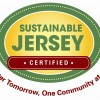
Towns enrolled in the Sustainable Jersey program can now get recognition for completing actions that make their communities more livable. The Sustainable Jersey action, Community Design for All Ages, launched in March 2022, offers several ways for municipalities to engage in age-friendly community-building. New Jersey Future participated in the development of the action, which is based on New Jersey Future’s Creating Great Places To Age: A Community Guide to Implementing Aging-Friendly Land Use Decisions.

In partnership with the NJ AARP chapter and other organizations, New Jersey Future is part of a collaborative effort to advance age-friendly state policy and local implementation, and with funding support from The Henry and Marilyn Taub Foundation, the Community Foundation of South Jersey, and the Grotta Fund for Senior Care, we’ve been able to conduct NJ-specific age-friendly research, develop a NJ-specific community guide, and work directly with communities to facilitate their local initiatives.

While responding to the unique needs of older adults, the cultivation of aging-friendly municipalities can also benefit community members across all age groups. At the Creating Aging-Friendly Communities Through Municipal Actions and Partnerships session at the 2021 Planning and Redevelopment Conference, aging-friendly advocates and local officials expressed the importance of aging-friendly communities and described strategies for making municipalities more inclusive for older adults.

Accessory dwelling units (ADUs) are an often overlooked and underutilized solution to the affordable housing shortage we face in New Jersey and across the Northeast. At the 2021 New Jersey Planning & Redevelopment Conference, a session entitled Two Homes, One Roof: Making NJ More Welcoming with ADUs discussed the importance of ADUs and their potential as a strategy for increasing the state’s housing options.

A summary of milestones recently achieved by a number of towns New Jersey Future is working with to implement aging-friendly land use goals.
See all New Jersey Future Blog posts and articles in this category »

